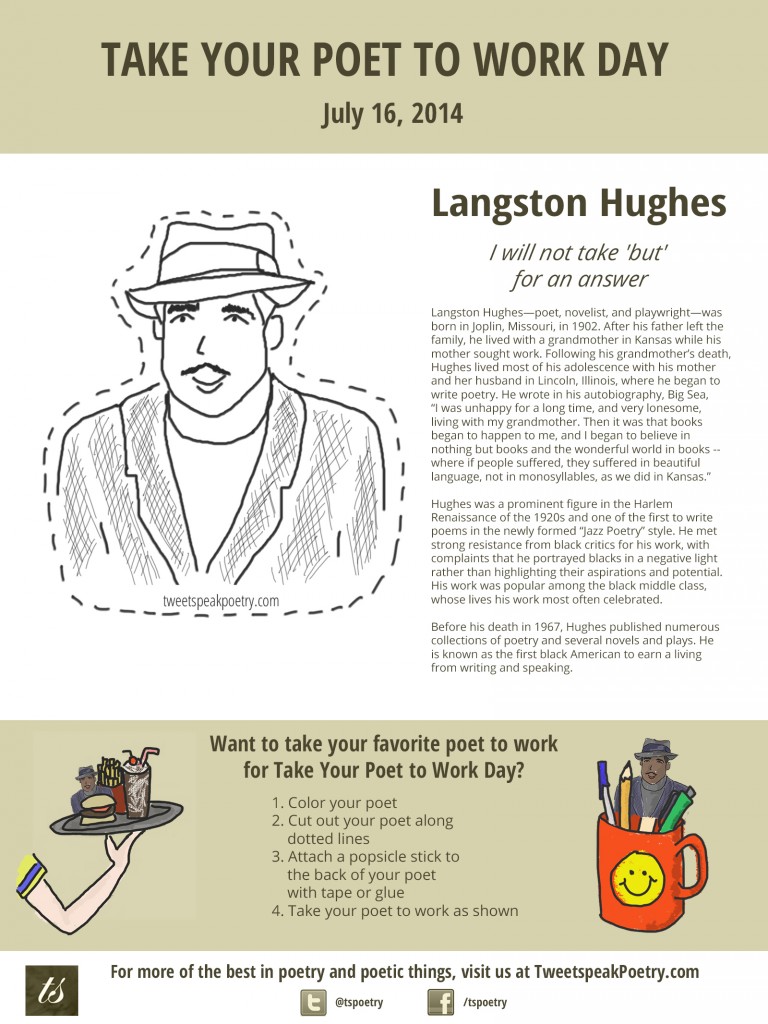Ever wish you could take your favorite poet along with you to work? Someone who would help you come up with just the right line, at just the right time. Maybe Langston Hughes could sit in on that big phone conference today and remind you not to “take ‘but’ for an answer.”
Take Your Poet to Work Day is coming July 16
To help you play and celebrate with us, we’re releasing poets each week in a compact, convenient format you can tuck in your pocket, tool belt, or lunchbox. Last year, we gave you Sara Teasdale, Pablo Neruda, T. S. Eliot, Rumi, Edgar Allan Poe, and the reclusive Emily Dickinson (for folks who work at home). We even released a full collection, The Haiku Masters: Matsuo Basho, Yosa Buson, and Kobayashi Issa.
This year, we’re building on the collection, adding one new poet each Wednesday for the next six weeks. We’re starting off this year’s celebration with Langston Hughes.
Take Your Poet to Work: Langston Hughes
Click here for a downloadable version of Langston Hughes Take Your Poet to Work that you can print, and color and cut out for the big day.
Langston Hughes
I will not take ‘but’ for an answer
Langston Hughes—poet, novelist, and playwright—was born in Joplin, Missouri, in 1902. After his father left the family, he lived with a grandmother in Kansas while his mother sought work. Following his grandmother’s death, Hughes lived most of his adolescence with his mother and her husband in Lincoln, Illinois, where he began to write poetry. He wrote in his autobiography, Big Sea, “I was unhappy for a long time, and very lonesome, living with my grandmother. Then it was that books began to happen to me, and I began to believe in nothing but books and the wonderful world in books — where if people suffered, they suffered in beautiful language, not in monosyllables, as we did in Kansas.”
Hughes was a prominent figure in the Harlem Renaissance of the 1920s and one of the first to write poems in the newly formed “Jazz Poetry” style. He met strong resistance from black critics for his work, with complaints that he portrayed blacks in a negative light rather than highlighting their aspirations and potential. His work was popular among the black middle class, whose lives his work most often celebrated.
Before his death in 1967, Hughes published numerous collections of poetry and several novels and plays. He is known as the first black American to earn a living from writing and speaking.
I, Too, Sing America
I, too, sing America.
I am the darker brother.
They send me to eat in the kitchen
When company comes,
But I laugh,
And eat well,
And grow strong.
Tomorrow,
I’ll be at the table
When company comes.
Nobody’ll dare
Say to me,
“Eat in the kitchen, ”
Then.
Besides,
They’ll see how beautiful I am
And be ashamed–
I, too, am America.
Dream Deferred
What happens to a dream deferred?
Does it dry up
Like a raisin in the sun?
Or fester like a sore–
And then run?
Does it stink like rotten meat?
Or crust and sugar over–
like a syrupy sweet?
Maybe it just sags
like a heavy load.
Or does it explode?
Learn more about Take Your Poet to Work Day and our featured poets
Check out our Poetry at Work Day Infographic and help spread the word
Learn more about Langston Hughes
Post and illustrations by Will Willingham.
- Earth Song Poem Featured on The Slowdown!—Birds in Home Depot - February 7, 2023
- The Rapping in the Attic—Happy Holidays Fun Video! - December 21, 2022
- Video: Earth Song: A Nature Poems Experience—Enchanting! - December 6, 2022

Maureen Doallas says
Lots of fun promised! Looking forward to seeing the other poets who’ll be joining us this year.
Thanks!
Megan Willome says
Really excited about this! There was a Langston Hughes story on “This American Life” this week (a rerun). It showed what a welcoming person he was.
And the play “Raisin in the Sun” is up for Tony’s tonight. So, awesome sauce!